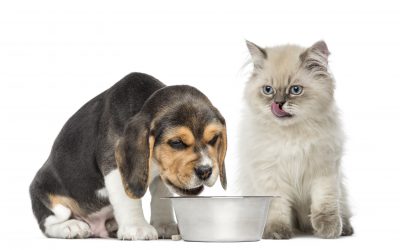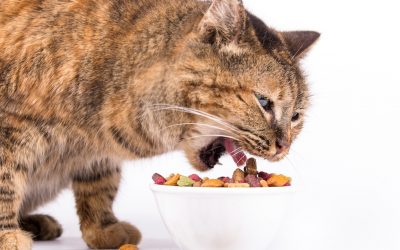Determining what food to feed your pets is one of the most important decisions you can make concerning your pet’s health. High quality dog food helps maintain appropriate levels of essential nutrients. Adequate nutrition means fewer digestive problems, firmer stools, healthier skin and coat, and a normal functioning immune system and metabolism. Animals with inadequate levels of vitamins and minerals become ill. The following will help you compare products and choose a pet food product.
What to look for
- Look for the AAFCO (Association of American Feed Control Officials) nutritional adequacy statement. It means that the basic requirements for vitamins and minerals have been met as set forth by the nonprofit organization.
- Look for top-grade ingredients (whole meat and vegetables) and make sure they are listed at the top of the ingredient list.
- If grains are used, make sure they are whole grains.
- Look for natural preservatives (organic compounds), such as tocopherols (vitamin E), citric acid (vitamin C), and plant extracts (rosemary extract).
- The Guaranteed Analysis (GA) on the label is mandatory and will provide the minimum levels of crude protein and fat as well as the maximum amounts of crude fiber and moisture. Use the formula below to compare wet and dry foods.

Life Stage
What life stage does your pet belong to right now? When it comes to pet food, there are only two life stage designations: Adult Maintenance and Growth/Reproduction. These are the only two life stages that food manufacturers adhere to because these are the only two stages regulated by AAFCO. This means that regardless of the marketing niche food manufacturers try to push, all pet foods will fall under one of the two life stages. You will, however, find some foods labeled as belonging to ‘all life stages’. These foods meet the nutritional requirements of both stage designations with the Growth/Reproduction stage being the more stringent of the two. This is because puppies and kittens experience rapid growth and require more calories and proteins than adults.
Size and Breed
The size and breed of your pet should factor into your pet food choice. This is because different nutritional needs exist across breeds as well as for small dogs and large dogs. Consider the musculoskeletal problems that may exist for certain large breeds of dogs. Nutrients that promote musculoskeletal health may be more significant for these breeds of dogs.
Medical History
Medical history should also guide your decision as conditions like liver disease, kidney disease, and diabetes have different requirements.
Special Diet
Special dietary needs will also narrow down your choices as things like allergies, sensitive stomachs, and dietary needs or restrictions play into your decision.
Dry, Wet, or Raw
Contrary to what most people think, wet (canned) food is a good alternative to dry food. Dry food and wet food have the same ingredients but in different quantities. Wet food is higher in meat, animal byproducts, and proteins derived from grains. It is also lower in carbs and preservatives. It has a long shelf life but requires refrigeration. Wet food is also more palatable. Dry food, on the hand, is the most affordable and does not require refrigeration. It has a longer shelf life, but is mostly dry matter with approximately 10% water. For this reason, many professionals will recommend you supplement dry food with canned food in order to ensure your pet gets enough moisture and protein.
Get Help
If you’re still confused about what kind of food to get your pet, discuss it with your veterinarian or nutritionist.






0 Comments